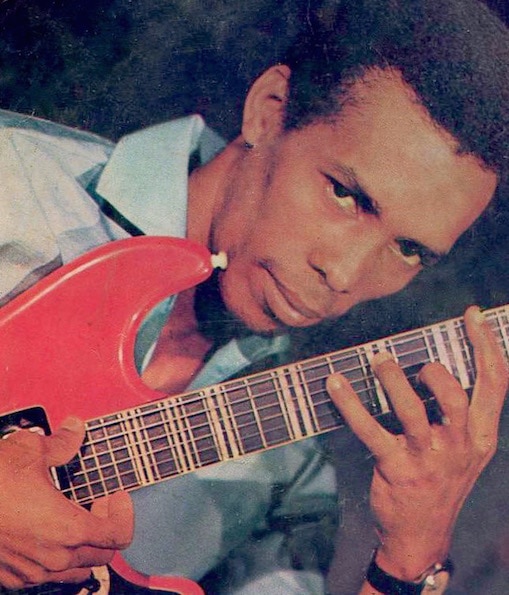Lyn Taitt
Born in 1934 in the San Fernando region of Trinidad, Nearlin ‘Lyn’ Taitt displayed an interest in music at an early age, and while still a youth he helped form a neighbourhood steel drum band, later winning an island-wide competition as a soloist. During this period, his creative approach to music making was illustrated in his creation of a new style that involved playing the instrument with three sticks, while his inquisitive mind enabled him also teach himself how to read and write music.
Taitt’s introduction to the guitar came soon after, the result of being asked by some neighbourhood friends to hide one stolen from a visiting sailor. Before long he had mastered the instrument to such an extent he was recruited into a local band, the Dutchy Brothers and after two years improving his style with the outfit, he formed his own, the Nearlin Taitt Orchestra.
In 1962, he and his group were invited to participate in the Jamaican Independence celebrations, resulting in a two-week tour of the island that while successful, led to little in the way of financial remuneration and while his disgruntled band members headed back to Trinidad, Taitt remained in Kinston, quickly becoming a member of local group, the Sheiks. Already an established live band, the Sheiks included such respected players as, Jackie Mittoo, Lester Sterling, Lloyd Knibb, Bobby Gaynair and Lloyd Spence and while a member of band, he gained an invaluable insight into the local music industry.
Later, Taitt, along with Lloyd Spence formed the Cavaliers, while soon after the guitarist attended his first recording sessions, playing in the new ska style on a number of sides for King Edwards and Duke Reid. He quickly became a regular player for Reid’s recordings, while also regularly working with the Skatalites at Studio One.
By the mid-sixties, the Cavaliers had evolved into the Comets and Taitt had been widely acclaimed as one of the most talented musicians on the Kingston scene, his flat-bodied electric guitar revolutionising providing a more dynamic edge to the sound of ska.
In 1966, Taitt created the style for which he is most widely associated. At a session backing singer, Hopeton Lewis at Ken Khouri’s Federal Studios In Kingston, he instructed his fellow musicians to slow to the tempo to fit the mood of the singer’s composition, ‘Take It Easy’. In addition, he and bass player, Bryan Atkinson played in unison, thereby creating the template for the rock steady sound that went on to dominate the local music for the next two years.
Taitt remained a driving force throughout the Rock Steady era, his band, playing on innumerable hit recordings for a variety of producers with his band, the Jets, whose number also included Atkinson on bass, pianist Gladstone ‘Gladdy’ Anderson and Joe Isaacs on drums. Aside from providing local hits for locals operators such as Duke Reid, Leslie Kong, Bunny Lee, Joe Gibbs, Richard Khouri and Sonia Pottinger, Taitt and the group also performed on international best-sellers that included ‘0.0.7 (Shanty Town)’ by Desmond Dekker & the Aces, the Ethiopians’ ‘Train To Skaville’ and Johnny Nash‘s breakthrough hits, ‘Cupid’ and ‘Hold Me Tight’. The latter, plus many of the Taitt’s best-known recordings from the rock steady period were included on the 2005 Trojan anthology, ‘Hold Me Tight’.
Late in 1968, whilst at the height of his popularity, Taitt travelled to Toronto in Canada to establish a band for the West Indian Federated Club. Although originally intended as a brief trip, he soon decided to remain in the country, earning his living playing throughout the province of Ontario. He later settled in Quebec, occasionally playing with the Skatalites following the group’s relocation to the New York area.
In later years, he regularly performed with Montreal-based group, La Gioventu, playing a variety of styles and in the nineties finally returned to the recording studio to record on the album, ‘New Oldies’. In 2002, he performed alongside a number of Jamaican greats in the ‘Legends of Ska’ reunion show in Toronto for the film, ‘Rock Steady: The Roots Of Reggae’, which saw release in 2009. By this time he was battling against cancer, and while he bravely fought against the disease, it was a struggle he would ultimately lose, the guitarist finally succumbing to its effects on Wednesday 20th 2010.
Lyn Taitt’s legacy is profound and cannot be underestimated. His pioneering approach to music making transformed Jamaican music and over the years has influenced generations of musicians the world over. He was a man truly worthy of the title, ‘Legend’.
LAURENCE CANE-HONEYSETT

